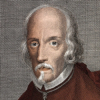Pedro Calderon de la Barca

Pedro Calderon de la Barca
Pedro Calderón de la Barca y Barreda González de Henao Ruiz de Blasco y Riaño, usually referred as Pedro Calderón de la Barca, was a dramatist, poet and writer of the Spanish Golden Age. During certain periods of his life he was also a soldier and a Roman Catholic priest. Born when the Spanish Golden Age theatre was being defined by Lope de Vega, he developed it further, his work being regarded as the culmination of the Spanish Baroque theatre...
NationalitySpanish
ProfessionDramatist
Date of Birth17 January 1600
CountrySpain
How surely a knowledge of the world hardens the heart!
For man's greatest crime is to have been born.
Dreams are rough copies of the waking soul Yet uncorrected of the higher will, So that men sometimes in their dreams confess An unsuspected, or forgotten, self; -Since Dreaming, Madness, Passion, are akin In missing each that salutory rein Of reason, and the grinding will of man.
No windows give a better view than those a man brings with him in his head, not asking for tickets of admission, since at all functions, festivals, or feasts he looks out with the same nice self-composure.
Light-enchanted sunflower, thou Who gazest ever true and tender On the sun's revolving splendour.
In this treacherous world Nothing is the truth nor a lie. Everything depends on the color Of the crystal through which one sees it
Even in dreams doing good is not wasted.
When love is not madness, it is not love.
Restless sunflower; cease to move.
What is life? A madness. What is life? An illusion, a shadow, a story. And the greatest good is little enough; for all life is a dream, and dreams themselves are only dreams.
Green is the prime color of the world, and that from which its loveliness arises.